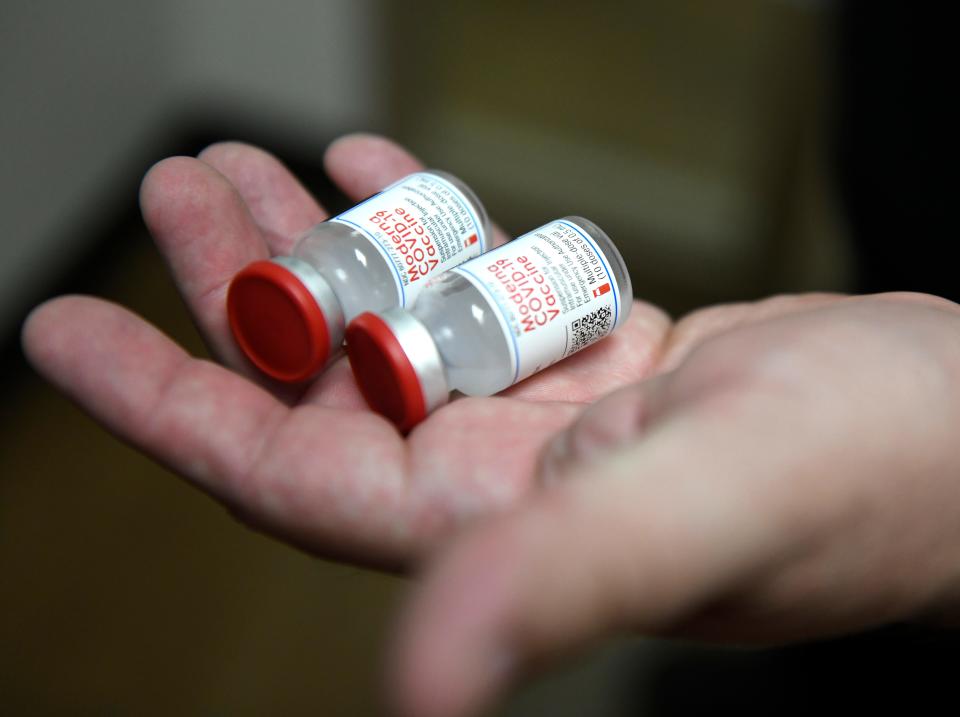City officials made a final decision on whether to send back a vaccine education grant
A $75,000 grant for vaccine education has been rejected by Corpus Christi officials following contentious dialogue between residents and among City Council members on whether the funding would be used to promote COVID-19 inoculation – and whether it should.
The Partnering for Vaccine Equity grant was originally intended to go to initiatives that would employ community engagement and data gathering to improve “understanding of current barriers to COVID-19 and influenza vaccinations for adults,” city records show.
In part, its aim had been to better facilitate relationships between residents and healthcare professionals, as well as bolster vaccination uptake and increase its availability, according to the documents.
However, the scope had been expanded to include all vaccines recommended by the CDC’s Advisory Committee on Immunization Practices, said Fauzia Khan, the city’s health director.

The council voted in January to accept the grant.
Last week, City Councilmen Mike Pusley, Michael Hunter and Gil Hernandez had requested reviving discussion on its acceptance.
Tuesday, councilmembers maintained their positions as the previous week with a split vote in which repealing the grant prevailed.
City Councilmen Hunter, Hernandez, Pusley, Roy and Mayor Paulette Guajardo voted to repeal the grant’s acceptance.
City Councilmen Jim Klein, Roland Barrera, Dan Suckley and City Councilwoman Sylvia Campos voted to retain acceptance of the grant.
Campos suggested that the discussion had become, in part, about political parties and the “two ways of how we see policy.”
“Apparently this has hit some buttons here,” she said. “It is sad that it has come to this that we, representing the city, are refusing to accept a $75,000 grant. This is a grant for educating the public about not just COVID-19 vaccinations but all vaccinations.”
Pusley disputed Campos’ suggestion political affiliation was influencing discussion, adding that part of the issue are questions about whether clients would be thoroughly counseled when discussing the vaccine.
“The decisions and votes I’ve taken as a member of this council have not been predicated on my political party,” he said. “…This is not a Democrat-Republican issue.”
Criticism from some residents speaking in public comment and some councilmembers centered around questions of any potential side effects associated with the vaccine – as well as its relative newness on the market – while supporters asserted the vaccine’s benefits in combatting the pandemic, pushing back on statements that serious side effects were common.
Several councilmembers last week had voiced concerns about the grant’s purpose and the original contract documents naming its focus on influenza and COVID-19 vaccines.
Although the city’s health district had applied for the grant with those terms, it had been before the state instituted legislation that barred putting a focus specifically on COVID-19 vaccines above other vaccines recommended, Khan said.
New statute as shown on the Texas Department of State Health Services website allows for education of the full suite vaccines listed among those recommended by the CDC’s Advisory Committee on Immunization Practices.
That includes the COVID-19 vaccine, Khan said.
She told the council last week that the local program had been adjusted to remain compliant with state guidelines by including all vaccines.
At the time, she did not have documentation readily available of communications with representatives of the organization that had awarded the grant – the National Association of County and City Health Officials – indicating that the nonprofit was in agreement with the changes.
Tuesday, Khan provided records that she said showed flexibility for the grant funding to go to work that would include all advisory committee-recommended vaccines.
The timing of the documents’ arrival was about an hour before the council meeting started, officials said.
The issue was not about vaccines in their totality, Hernandez said, but instead about the language shown in the original grant records – that the grant was centered on efforts related to COVID-19 and influenza vaccines.
There had been erroneous conflation between scrutiny of the COVID-19 vaccine and vaccines as a whole in some of the comments made by residents, he added.
“No one is against all vaccines,” Hernandez said. “This is specific to the COVID-19 vaccine.”
It would have been the clients’ choice on whether to receive the vaccine, grant supporters said.
“We are just educating the people,” Khan said.
There are significant shortfalls in healthcare education within the community, Barrera said.
“One of the biggest challenges that we face here in the Coastal Bend is access to care… access to understanding what’s the best way to get that care, access to understanding the availability of care, and access to understand the importance of getting preventative care,” he said.
The grant would have worked through reimbursements.
The health district has so far accumulated about $30,000 in costs related to the local program that had been planned for reimbursement, city officials said.
In a message to the Caller-Times last week, City Manager Peter Zanoni wrote that funding to cover the already-incurred costs would come from money in the existing budget, savings from vacancies and “if necessary, cuts in planned expenditures in the future.”
More: City officials may return a $75,000 grant for vaccine education. Here's why.
More: Months after rebuilding health district, Corpus Christi hires new health director
This article originally appeared on Corpus Christi Caller Times: Here's how the city decided on a controversial vaccine grant

